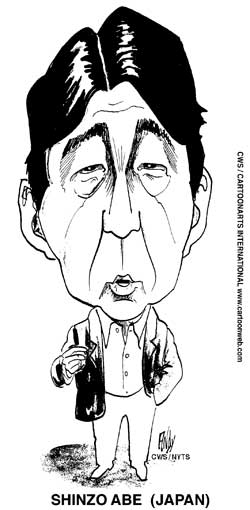Is Japan the country of the future again?
In the broad sense, surely not, if only because of demography: the Japanese combine a low birth rate with a deep cultural aversion to immigration, so the future role of Japan will be severely constrained by a shortage of Japanese people.
But something very odd is happening on the short- to medium-term macroeconomic front. For the past three years macro policy across the developed world has been dominated by Austerian orthodoxy; even where there haven’t been explicit austerity policies, as in the United States, fear of deficits has led to de facto fiscal tightening, while monetary policy has fallen far short of the kind of dramatic expectation-changing moves theoretical analysis suggests are crucial to an economy trying to gain traction in a liquidity trap.
Now, one country seems to be breaking with the orthodoxy — and it is, surprisingly, Japan. According to a recent New York Times article: “The Japanese government approved emergency stimulus spending of ¥10.3 trillion Friday, part of an aggressive push by Prime Minister Shinzo Abe to kick-start growth in a long-moribund economy.
“Mr. Abe also reiterated his desire for the Japanese central bank to make a firmer commitment to stopping deflation by pumping more money into the economy, which the prime minister has said is crucial to getting businesses to invest and consumers to spend.”
This is especially remarkable because Japan has been held up so often as a cautionary tale: Look at how big their debt is!
Disaster looms! Indeed, back in 2009 there were many stories to the effect that the long-awaited Japanese debt catastrophe was finally coming.
But, actually, not. Japanese long-term interest rates rose in the spring of 2009 because of hopes of recovery, not fear of bond vigilantes. And when those hopes faded, rates went back down, and are currently well under 1 percent.
Now comes Shinzo Abe. As Noah Smith, the blogger and writer for The Atlantic, informs us, he is nobody’s idea of an economic hero; he’s a nationalist, a denier of World War II atrocities, a man with little obvious interest in economic policy. If he’s defying the orthodoxy, it probably reflects his general contempt for learned opinion rather than a considered embrace of heterodox theory.
But that may not matter. Mr. Abe may be ignoring the conventional wisdom on spending, and bullying the Bank of Japan, for all the wrong reasons — but the fact is that he is actually providing fiscal and monetary stimulus at a time when every other advanced-country government is too much in the thrall of the Very Serious People to do something different. And so far the results have been entirely positive: no spike in interest rates, but a sharp fall in the yen, which is a very good thing for Japan.
It will be a bitter irony if a pretty bad guy, with all the wrong motives, ends up doing the right thing economically, while all the good guys fail because they’re too determined to be, well, good guys.
But that’s what happened in the 1930s, too.
Join us in defending the truth before it’s too late
The future of independent journalism is uncertain, and the consequences of losing it are too grave to ignore. To ensure Truthout remains safe, strong, and free, we need to raise $44,000 in the next 6 days. Every dollar raised goes directly toward the costs of producing news you can trust.
Please give what you can — because by supporting us with a tax-deductible donation, you’re not just preserving a source of news, you’re helping to safeguard what’s left of our democracy.
